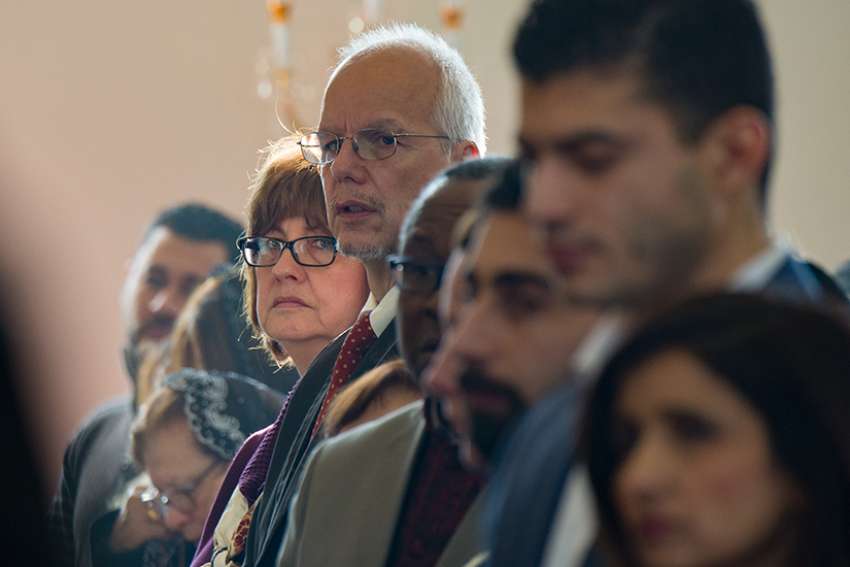“We are truly thankful for the many blessings so many migrants and refugees have brought to our Church,” Kirkpatrick told a packed crowd Jan. 14 at The Good Shepherd Chaldean Catholic Cathedral on World Day of Migrants and Refugees.
With refugee families scattered among the regular Iraqi-Catholic congregation at The Good Shepherd in the northwest corner of Toronto, Kirkpatrick emphasized how the refugee experience is shared by Jesus and the Holy Family in their flight to Egypt.
“May the Blessed Virgin Mary help us to serve her Son by helping us to welcome every stranger,” said Kirkpatrick in his sermon.
In 2017, Toronto Catholics welcomed 1,193 newcomers sponsored through the Office for Refugees, Archdiocese of Toronto. Another 4,000 refugees are currently in the pipeline, reports ORAT director Deacon Rudy Ovcjak.
Ovcjak takes over from departing ORAT director Martin Mark, who built the office over the last 15 years.
The office was able to launch 381 sponsorship applications last year. Toronto parishes are now waiting for 95 refugees from central and west Africa, 10 from Afghanistan and Pakistan and 276 from Iraq and Syria.
Last year’s completed resettlements included 82 arrivals from Africa, 29 from Pakistan, Afghanistan and Tibet and 1,082 from either Syria or Iraq.
The 2015 Project Hope refugee sponsorship initiative, which raised $4.2 million with the goal of welcoming 100 extra refugee families, has so far resulted in 249 refugees arriving in Canada. Another 224 Project Hope refugees are still awaiting final approval for travel from Immigration Refugees and Citizenship Canada.
The intense activity among Toronto Catholic parishes sponsoring refugees comes at a time when Pope Francis is encouraging more countries to adopt sponsorship systems in order to welcome refugees more effectively.
“I hope that a greater number of countries will adopt private and community sponsorship programs,” said Pope Francis in this year’s message for the 104th World Day of Migrants and Refugees.
Ovcjak can’t say whether the Pope has Canada’s system specifically in mind, but he knows it’s a system that has worked well for Canadian Catholics.
“It’s a clear response of the Catholic community to the Lord’s command to ‘love our neighbour as ourselves,’ ” Ovcjak told The Catholic Register in an email. “The PSR (private sponsorship of refugees) model is built upon the generosity of Canadians who provide the money necessary to settle a newcomer.”
Ovcjak sees evidence that other countries are interested in imitating Canada’s private sponsorship model.
“When the UN High Commissioner for Refugees, Filippo Grandi, met with Prime Minister Trudeau in November 2017, he recognized Canada’s excellent PSR program,” he said.
For Pope Francis, personal involvement in the lives of refugees and migrants is a concrete sign of genuine faith in Christ.
“Every stranger who knocks at our door is an opportunity for an encounter with Jesus Christ,” he said. “Solidarity must be concretely expressed at every stage of the migratory experience, from departure through journey to arrival and return…. I reiterate the need to foster a culture of encounter in every way possible — by increasing opportunities for intercultural exchange, documenting and disseminating best practices of integration and developing programs to prepare local communities for integration processes.”
Despite this, Ovcjak is not quite willing to claim exclusive rights to the culture of encounter for ORAT.
“As I reflect upon the words of Pope Francis — the ‘culture of encounter’ — I think of the entire work of the archdiocese,” he said.


